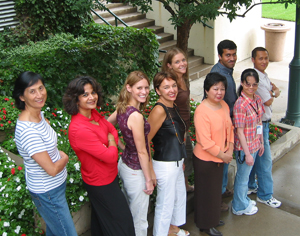 |
Anuja Ghorpade, Ph.D., executive vice chairwoman and associate professor of the department of pharmacology and experimental neuroscience, was named the 2007 Gilmore Award winner for her research on the inflammation of the glia, the cells hold together the cellular system of the brain. Howard Gendelman, M.D., chairman, UNMC Department of Pharmacology and Experimental Neuroscience, says Dr. Ghorpade is one of the most complete scientists he’s ever seen. |
Although most researchers are encouraged to find their niche at another institution after completing post-doctoral fellowships, Dr. Ghorpade has spent her entire 12-year career at UNMC.
In a world where even the president of Harvard University publicly implied that women lack the necessities for extensive careers in science, Dr. Ghorpade is staking a solid claim to national leadership in the study of inflammation on the glia — the cells that act as “glue” holding together the cellular system of the human brain.
And as her profile rises in the scientific community, Dr. Ghorpade believes being a woman is one of her strongest assets, especially as an educator and laboratory team leader.
|
|
Dr. Ghorpade is executive vice chairwoman and associate professor of the department of pharmacology and experimental neuroscience. She also is the fourth straight member of the CNND to receive the Gilmore Award — an achievement that she personally considers more meaningful than her own award.
When Dr. Ghorpade joined Dr. Gendelman’s team in 1995, she started studying microglia and the reactions that happen when these cells get infected with human immunodeficiency virus (HIV). During this period, she had an opportunity to investigate the literature and microscopic stains of cells and brain tissues from patients who died of HIV-related encephalitis.
She found a niche that was not being considered by many investigators at that time — what is happening to the glia throughout the brain, particularly when their supportive cells, called astrocytes or astroglia, undergo changes relating to inflammation.
“Astrocytes seem to perform for neurons almost the same function as a mother for her child,” Dr. Ghorpade said. “They take care of them, nourish them, protect them and when there is an injury to the brain, they try to help fix it. The difference is that while children eventually outgrow their dependence on their mother, neurons remain dependent on atrocytes forever for their supportive functions.”
By 1999, Dr. Ghorpade was writing grants to investigate what was happening to the functions of the glia cells because there were indications that under inflammation, they may actually change their function and become harmful to the neurons. She received her first RO1 grant in 2001 for glial research.
“When I started in this area, I had no clue that the field of glial biology also was undergoing a revolution,” Dr. Ghorpade said. “There were about 98 grants administered in glia research in 2002 just on one study section, but three years later, there were 180 grants submitted in this area. Over the last five years, the number of investigators in glial-biology has almost tripled. A lot of concepts previously taken for granted about what these cells are doing in the brain are now under substantial reevaluation and I believe that UNMC is on the ground floor of these new developments.”
Although Dr. Ghorpade is not a clinician, she and her nine laboratory colleagues never lose sight of the human dimension of their investigations. Not only has Dr. Ghorpade participated in clinical rounds of HIV patients to take notes and do interviews, she has worked with people living with the virus in her laboratory.
“Although HIV-related dementia only occurs in about 11 percent of the HIV population, it can be devastating to the patients,” Dr. Ghorpade said. “Today, many HIV patients may expect to live from 20 to even 30 years or more. Mental debility may not be unexpected in senior citizens, but the HIV population is fairly young, most in their 30s and 40s, and mental dysfunction is an absolutely frightening thought to them.
“Our brain is not just the organ of thought. It is the organ of our personality, who we see ourselves as human beings. If our research in HIV-related dementia opens up new avenues of investigation in the fight against other dementias such as Alzheimer’s and Parkinson’s disease due to common disease mechanisms, so much the better for humanity.”
Born and raised in Bombay, India, Dr. Ghorpade is the daughter of a physician mother and surgeon father. Not surprisingly, she developed an early love for science. She received her bachelor of science in microbiology from the University of Bombay, Mumbai, India, in 1987; her master’s of science degree in biotechnology from Maharaja Sayajirav University of Baroda, Gujarat, India, in 1989 and her doctorate in molecular biology from the National Institute of Immunology, New Delhi, India, in 1994.
Dr. Ghorpade’s journey to UNMC unknowingly began with her master’s thesis and was aided by a couple of purely fortuitous circumstances. For her masters seminar topic, she chose to research a new, rapidly spreading world disease that had acquired a formal name right around that time — human immuno-deficiency virus (HIV) — the precursor to AIDS that was earlier called HTLV III.
In 1994, upon completion of her doctorate, Dr. Ghorpade moved to Omaha and worked with Dr. Mario Stevenson, one of the first recipients of the Gilmore award in 1989. He moved on to the University of Massachusetts School of Medicine a year and a half later and wanted Dr. Ghorpade to join him. But Dr. Cohen and Dr. Gendelman already had convinced her that her future was at UNMC.
“When I started working with Dr. Gendelman, I could see that he already was developing the most diverse and unique work environment any investigator could ask for,” Dr. Ghorpade said. “I could see my future. I could see the path that was leading to where I am today.”
 |
Dr. Ghorpade and her lab personnel from left: Li Wu, Dr. Anuja Ghorpade, Jessica Gardner, Dr. Raisa Persidsky, Kathleen Borgmann, Betty Chin, Sugato Banerjee, Clara Chao and Dr. Wei Kou. |
“There is a widespread theory that post-docs are reinvigorated and do better when they go to a new institution. But this traditional notion does not account for the extraordinary leadership of Drs. Sam Cohen and Howard Gendelman because they envision post-doctorate researchers as long-term investments,” she said. “I was a fresh-faced graduate when I came to UNMC and there are very few institutions in the United States that would even consider developing and promoting post-docs to the level of responsibilities I have achieved at UNMC. ”
Not only has Dr. Ghorpade lived up to her promise, her greatest satisfaction is that she did it while maintaining balance of career and family.
“The Gilmore Award speaks volumes about the vision and environment of the CNND and UNMC,” Dr. Ghorpade said. “I always strive to find the right balance between research, teaching responsibilities, administrative duties and family. We have a unique work environment at UNMC and CNND, where we can put equal emphasis on all. I’m having a wonderful career and a home life to match. It takes some work, but it is possible to have it all.”